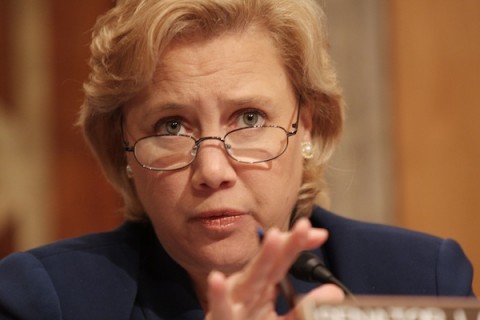Some Gulf Lawmakers With Ties to Oil Industry Downplay Spill in Their Own Backyard
Retreat is not an option, says Sen. Mary Landrieu (D-La.). We must continue to drill.
Jul 31, 202044.7K Shares1.3M Views
Sen. Mary Landrieu (D-La.) (WDCpix)
Last week — as thousands of barrels of oil were gushing each day from an uncapped well on the floor of the Gulf of Mexico — Sen. Mary Landrieu (D-La.) took to the chamber floor to say that she didn’t want “to minimize” the severity of the disaster. Then she spent the next 20 minutes doing just that.
[Environment1]The slick, Landrieu said, contains “only 3 percent” thick emulsified crude that exists as “a very thin layer” — only as thick as “a couple of strands of hair.” The 5,000 barrels spilling out each day, she noted, represent “less than one-fourth of 1 percent” of the nation’s daily consumption. Relative to that requirement “the industry spill rate is quite low,” she argued.
“It is more risky to import our oil in tankers than it is to drill for it offshore, even considering this disaster that we’re dealing with today,” Landrieu said. “Retreat is not an option. … We must continue to drill.”
On one hand, that message has stumped environmentalists, government watchdogs and some of Landrieu’s own Democratic colleagues, who are pointing to the ongoing disaster as clear reason why policymakers should abandon any plans to expand offshore drilling and focus instead on cleaner energy alternatives. On the other, the oil industry is a powerful economic engine in Louisiana, and hasn’t been shy about showering the state’s congressional delegation with campaign cash. Indeed, the more than $758,000 Landrieu has accepted from the industryover her Capitol Hill tenure ranks 10th among all active lawmakers. Even following the worst drilling disaster in decades — even though the spill rests in Landrieu’s backyard — clean-energy advocates aren’t counting on the Louisiana Democrat for any serious support on drilling reform.
“There’s a reason why [corporations] contribute money into the political process,” said Tyson Slocum, head of the energy program at Public Citizen, a government watchdog group. “They’re giving money, not out of charity, but for the promotion of their own self interests. It’s with the explicit intention of getting something in return.”
Landrieu’s office this week denied that the industry’s financial backing has swayed her position on energy policy. “Campaign contributions, from energy companies or from environmental groups, have absolutely no impact on Sen. Landrieu’s policy agenda or her response to this unprecedented disaster in the Gulf,” a spokeswoman toldOpenSecretsblog, which noted that Landrieu had received more campaign money from British Petroleum — the owner of the leaking Gulf well– than any other lawmaker in the last election cycle.
Landrieu, of course, is hardly the only defender of the oil industry, nor is she alone in downplaying the severity of the spill. Louisiana’s other upper-chamber lawmaker, GOP Sen. David Vitter, has also taken steps to protect the industry in the wake of the disaster. Vitter has called to increase the flow of money from Washington, to delay the Senate’s investigation into the spill, and to relieve BP of some of the responsibility for immediate cleanup.
“BP is spread too thin in trying to both cap the well and remediate the damage along the coastline, producing an inefficient and ineffective response,” he saidlast week in a statement.
Vitter has accepted more than $766,000 from the oil and gas industries in his career, placing him just ahead of Landrieu among active lawmakers.
There are others. Rep. Gene Taylor (D-Miss.), after flying over the spill last weekend, came to the conclusion that the damage posed by the accident “is not Armageddon.”
“The oil spill is certainly bad. And it’s terrible that there’s a spill out there,” Taylor said. “But I would remind people that the oil is twenty miles from any marsh. The spill starts breaking up in smaller pieces naturally.”
Not everyone agrees. Several of Landrieu’s Democratic colleagues on Tuesday introduced legislation that would force oil companies to pay more for damages following oil spills like that afflicting the Gulf. Sponsored by Sens. Bill Nelson (Fla.), Robert Menendez (N.J.) and Frank Lautenberg (N.J.), the bill would hike the industry’s liability cap for such damages from $75 million to $10 billion.
“Oil companies must be held responsible for every cost related to an oil spill,” Lautenberg said, “and that includes both the environmental and economic damages.”
In Landrieu’s eyes, such damages are a small price to pay for the privilege of harvesting the oil and gas from within our own borders.
“No one has ever claimed, including myself, who’s an unabashed proponent of the industry, that drilling is risk free,” she said.

Paula M. Graham
Reviewer
Latest Articles
Popular Articles
